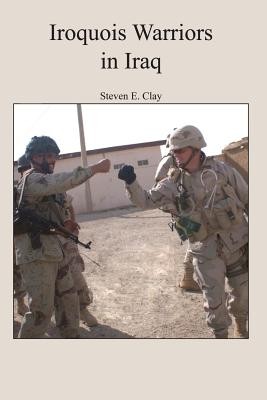
- We will send in 10–14 business days.
- Author: Steven E Clay
- Publisher: CreateSpace Independent Publishing Platform
- Year: 2013
- Pages: 290
- ISBN-10: 1494307324
- ISBN-13: 9781494307325
- Format: 15.2 x 22.9 x 1.6 cm, softcover
- Language: English
- SAVE -10% with code: EXTRA
Reviews
Description
The role of the Organized Reserves in the history of the US Army has taken many twists and turns since the nation's founding. The organization and missions of the Army's reserves, both the National Guard and the Army Reserve, are once again undergoing fundamental change to meet the needs of the 21st century. In Iroquois Warriors in Iraq, Mr. Steve Clay analyzes the role played by the "Iroquois Warriors" of the US Army Reserve's 98th Division (Institutional Training). In an unprecedented move, the soldiers of the 98th were called on in mid-2004 to deploy to Iraq and to fulfill a critical role in the building, training, and advising of the new Iraqi Army. This monograph is the story of how that concept evolved and how it came to form a nexus with MNSTC-I that resulted in the use of a USAR training division for an overseas combat mission for the first time in US Army history. The monograph presents issues connected with the mobilization, deployment, training, and integration of Reserve Component (RC) units and personnel in general; the use of units to perform tasks not part of their mission essential task list (METL); and issues associated with the major task assigned to the 98th Division-training and advising a foreign army. It finishes with an analysis of the overall mission and provides conclusions and recommendations for consideration. The intent of this monograph is to expose leaders and soldiers to the issues described above, so in future conflicts, and perhaps even for the current conflict, they might gain insights that will enable them to develop solutions should similar problems arise.
EXTRA 10 % discount with code: EXTRA
The promotion ends in 20d.12:27:04
The discount code is valid when purchasing from 10 €. Discounts do not stack.
- Author: Steven E Clay
- Publisher: CreateSpace Independent Publishing Platform
- Year: 2013
- Pages: 290
- ISBN-10: 1494307324
- ISBN-13: 9781494307325
- Format: 15.2 x 22.9 x 1.6 cm, softcover
- Language: English English
The role of the Organized Reserves in the history of the US Army has taken many twists and turns since the nation's founding. The organization and missions of the Army's reserves, both the National Guard and the Army Reserve, are once again undergoing fundamental change to meet the needs of the 21st century. In Iroquois Warriors in Iraq, Mr. Steve Clay analyzes the role played by the "Iroquois Warriors" of the US Army Reserve's 98th Division (Institutional Training). In an unprecedented move, the soldiers of the 98th were called on in mid-2004 to deploy to Iraq and to fulfill a critical role in the building, training, and advising of the new Iraqi Army. This monograph is the story of how that concept evolved and how it came to form a nexus with MNSTC-I that resulted in the use of a USAR training division for an overseas combat mission for the first time in US Army history. The monograph presents issues connected with the mobilization, deployment, training, and integration of Reserve Component (RC) units and personnel in general; the use of units to perform tasks not part of their mission essential task list (METL); and issues associated with the major task assigned to the 98th Division-training and advising a foreign army. It finishes with an analysis of the overall mission and provides conclusions and recommendations for consideration. The intent of this monograph is to expose leaders and soldiers to the issues described above, so in future conflicts, and perhaps even for the current conflict, they might gain insights that will enable them to develop solutions should similar problems arise.


Reviews